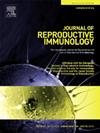Age-matched analysis of endometrial immune profile between frozen embryo transfer success and recurrent implantation failure cases with predictive model
IF 2.9
3区 医学
Q3 IMMUNOLOGY
引用次数: 0
Abstract
Successful implantation during frozen embryo transfer (FET) is influenced by multiple factors. However, the role of endometrial immune cells in predicting FET outcomes remains unclear, particularly in an age-independent context. This study aimed to develop a prediction model based on endometrial immune cell characteristics to predict FET outcomes regardless of patient age. We analyzed 78 patients undergoing FET (2021–2023), categorized into successful FET and Recurrent Implantation Failure (RIF) groups. After age-matching via Propensity Score Matching, endometrial immune cell profiles were compared between groups. Key predictors identified through Elastic Net analysis were used to develop a CatBoost prediction model. Before age matching, significant differences between groups were observed in age, neutrophil, monocyte, lymphocyte, and CD56hiCD16-NK levels. After age matching, only lymphocyte and B cell levels remained significantly different. The model using lymphocytes, CD56hiCD16+ NK cells, and B cells as predictors achieved ROC AUC scores of 0.88 (age-matched test set) and 0.84 (full dataset), with 0.80 accuracy. CD56hiCD16+ NK cells showed strong positive correlation with RIF. This study reveals a novel association between CD56hiCD16+ NK cells and recurrent implantation failure. The age-independent prediction model demonstrates the potential of immune cell profiling for predicting FET outcomes and may guide personalized reproductive medicine approaches.
冷冻胚胎移植成功与反复植入失败患者子宫内膜免疫特征的年龄匹配分析及预测模型
冷冻胚胎移植(FET)的成功着床受多种因素的影响。然而,子宫内膜免疫细胞在预测FET结果中的作用仍不清楚,特别是在年龄无关的情况下。本研究旨在建立一个基于子宫内膜免疫细胞特征的预测模型,以预测FET的结果,而不考虑患者的年龄。我们分析了78例接受FET(2021-2023)的患者,将其分为FET成功组和RIF复发组。通过倾向评分匹配进行年龄匹配后,比较各组子宫内膜免疫细胞谱。通过Elastic Net分析确定的关键预测因子用于开发CatBoost预测模型。年龄配对前,各组间年龄、中性粒细胞、单核细胞、淋巴细胞、CD56hiCD16-NK水平均有显著差异。年龄匹配后,只有淋巴细胞和B细胞水平仍有显著差异。该模型使用淋巴细胞、CD56hiCD16+ NK细胞和B细胞作为预测因子,ROC AUC得分分别为0.88(年龄匹配测试集)和0.84(完整数据集),准确率为0.80。CD56hiCD16+ NK细胞与RIF呈强正相关。这项研究揭示了CD56hiCD16+ NK细胞与复发性植入失败之间的新关联。这个与年龄无关的预测模型显示了免疫细胞谱预测FET结果的潜力,并可能指导个性化的生殖医学方法。
本文章由计算机程序翻译,如有差异,请以英文原文为准。
求助全文
约1分钟内获得全文
求助全文
来源期刊
CiteScore
6.30
自引率
5.90%
发文量
162
审稿时长
10.6 weeks
期刊介绍:
Affiliated with the European Society of Reproductive Immunology and with the International Society for Immunology of Reproduction
The aim of the Journal of Reproductive Immunology is to provide the critical forum for the dissemination of results from high quality research in all aspects of experimental, animal and clinical reproductive immunobiology.
This encompasses normal and pathological processes of:
* Male and Female Reproductive Tracts
* Gametogenesis and Embryogenesis
* Implantation and Placental Development
* Gestation and Parturition
* Mammary Gland and Lactation.

 求助内容:
求助内容: 应助结果提醒方式:
应助结果提醒方式:


